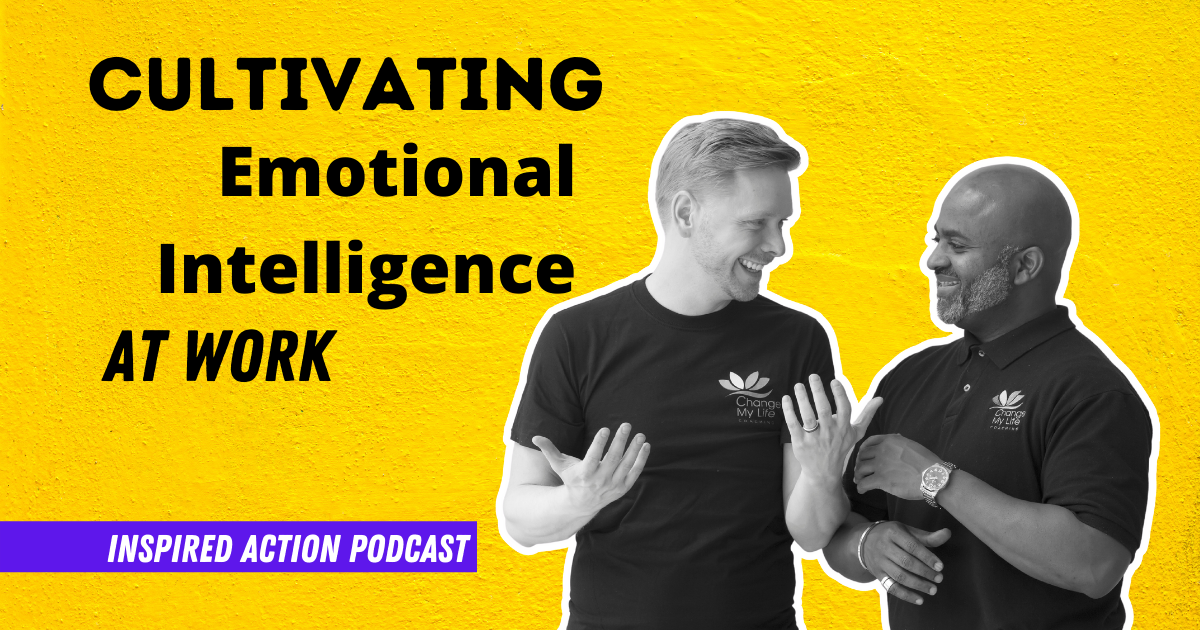“Cultivating Emotional Intelligence at Work” Brief Summary:
“Most workers being 92% think they have strong emotional intelligence. But fewer than 74% believe that their bosses do”
Are you emotional in the workplace? Or do you check your emotions at the door? In this Inspired Action for Imperfect Humans podcast episode Christopher Lawrence and Kyle Kalloo discuss emotions in the workplace, and why cultivating emotional intelligence in the workplace is highly important to having better teams.
Summary:
- Introduction
- Christopher tells his story of how emotions are his superpower
- Some statistics regarding emotions in the workplace
- Kyle chats about Daniel Goldman’s book “Emotional Intelligence”
- Emotional granularity, what is it?
- What is not acceptable in the workplace
Calls to Action:
Even before the remote workforce evolution, office culture was inherently fragile. After all, it’s made up of imperfect humans interacting with other imperfect humans. And while perfection isn’t the goal, we all secretly wish for a workplace where people find ways to bring out the best in each other. Unfortunately, that’s not always an intuitive skill. It takes guidance, practice, and then more guidance and practice… but with the right leadership, it’s definitely achievable. How do you enhance your workforce’s ability to engage, collaborate, and adapt in this volatile and uncertain reality? Get the answers to your culture questions when you setup a complimentary Discovery Session with Kyle Kalloo at https://ChangeMyLifeCoaching.as.me/?appointmentType=14623413
Not loving your career? Feel you need a change in your job? Let’s Strategize! Book a complimentary Strategy Session with Christopher Lawrence here: https://ChangeMyLifeCoaching.as.me/?appointmentType=14044176
Tell us your “inspired stories” stories by visiting www.InspiredActionPodcast.ca
Christopher Lawrence LinkedIn: https://www.linkedin.com/in/career-life-coach-christopher-lawrence/
Kyle Kalloo LinkedIn: https://www.linkedin.com/in/kyle-kalloo/
Change My Life Coaching & Change My Business Coaching LinkedIn: https://www.linkedin.com/company/6446498/admin/
Looking to create a corporate coaching culture? Reach out to Kyle Kalloo: [email protected]
Website: https://strategicleader.ca
“Cultivating Emotional Intelligence at Work” Transcript:
[00:00:00] Most workers listen to this being 92% think they have strong emotional intelligence. But fewer than 74% believe that their bosses do, is the thought of being imperfect, keeping you from taking action. Welcome to inspired action for imperfect humans. Each week, we give you real life stories and thought-provoking research that inspires your soul to live a more fulfilled life through your own actions.
From the heart of Calgary Canada. Here are your hosts. Award-winning coaches, Christopher Lawrence and Kyle Kalloo. Hello. Hello, ladies and gentlemen, boys and girls, everyone. Welcome to another exciting week of our past our podcast. You know, it was happening for me there. Christopher, you weren’t paying attention as usual. No, I would say to myself, remember the name?[00:01:00]
And then by saying that, remember the name? I forgot. I messed it up. So inspired action for imperfect human podcasts and I’d even look it up. So this is great. Listen, how you doing, buddy? I don’t know. I keep thinking. I need to get. Um, a packet of post-its or something. So you can write yourself a reminder about what our podcast is called that we’ve been doing for four seasons.
I think you’re onto something there. I think you’re onto something, but I think, you know, maybe that’s a good thing. That’s maybe it has something to do with my emotional intelligence that I’m so emotionally connected with self that my intelligence is really about myself and not external. Could that be.
Do you think? No, not at all.
Now, listen, I wanted to chat about emotional intelligence today only because you and I have gone [00:02:00] back and forth and we’ve worked with different people. And we’ve spoke about this, um, you know, in different occasions when it comes to emotions, because there’s still this thing around keeping emotions. Out of the organization, keeping emotion sometimes even in our personal relationships, right.
When we get so emotionally engaged, sometimes it goes off and then we talk about it’s okay to be mindful for your emotions. So I’m just wondering, which is it have emotions, don’t have emotions. Does emotion intelligence actually speaks to it. What’s the final word on the emotions? I think this is a, a really interesting thing, Kyle, and it’s something that I pay a lot of attention to because certainly when I was in working in a corporate, I’ll tell you a story here.
Um, on three separate occasions in my career, I was criticized as being too emotional. And in two cases, I [00:03:00] was called Mr. Sensitive. Um, which is, uh, well, it doesn’t, I’ll just say it doesn’t happen anymore. Is that a, is that a problem though, to be sensitive or mean, I mean, I think with context. Well, I think this is the problem though, is that I think you have to remember.
And honestly, we don’t do this very often on our podcasts, but I think that this actually has to do with, um, like white male heterosexual bias in a way, because. ’cause if you look at it, it’s like it started, I don’t know when, but like the weaker sex as women and it’s because women are emotional. Uh, right.

And so I’m wondering if there’s some carry through from that where emotions are not seen as high currency in the workplace, but I think what’s not actually seen as. Hi, [00:04:00] currency in the workplace is when people lose control of their emotions. I think, I think that’s the bigger issue here. It’s interesting.
I, um, I coach a couple of excuse the term alpha males and the reason why they’re they’re young, alpha males, but they’re so woke and they’re like, they’re like, even though I’m going to be a tribal leader one day, Right or, and, and in some cases are right. Like they’re both in leadership positions. They, they recognize that they have to understand their own emotions to be able to lead effectively.
And so I’m so privileged to be able to coach them honestly. Um, in my own case, it was so funny because the last time somebody says, wow, you’re really sensitive about these things. Hey, I, uh, I responded reacted, uh, by slamming the door and saying, you [00:05:00] bet your bottom dollar I’m goddamn sensitive. I’m like, that’s why my team performs the best out of any team in this company.
And we’ve got the numbers to prove it. That’s why you give me the biggest raises biggest bonuses. It’s because I’m I’m self-aware so the next time you’re going to insult me by calling me Mr. Sensitive. You’re going to attach a big fat paycheck to it. Cause you’re taking advantage of it. You might not like the liability of it, but I’ll get him passionate about it if you want.
I learned a few things since then. Yeah. I mean, I’ve said this often where I actually like that someone is emotionally connected, right? Yes. I agree. Sometimes someone can get really emotional and to the point where it’s disruptive. Um, uh, however, there’s something behind that that’s worth. Right. We can’t just say, oh my God, that person is so sensitive.
Oh, that guy, that person takes everything. So literally that there’s something going on. And I think, you know, I’d rather that, because then it allows for dialogue, I think it allows for you to be able [00:06:00] to uncover and engage that person versus the one that you don’t even know what’s happening. I mean, I’d be worried about those folks right.
Where we don’t even know what’s happening because there’s people who do that. Right. Right. Yeah. I totally agree. It’s interesting too, because I think that there’s a lot of confusion about like, what is. You know, like, like I, uh, I worked for the guy who was a very old school guy who was a contractor and he was known for getting results, but the way that he got results and I’m not even kidding you, like, like prior to him working with us in, in the eighties and nineties, he’d walk into a room and he’d be like, we miss the project deadline, you’re all fired.
And he would fire the whole room, uh, the entire project team of 30 people. On the spot and, and that’s seen as, you know, like that’s, that’s seen as like leadership or as like taking charge. And it’s like, you know, that’s really appropriate in one case, which is probably if all 30 people had risked the lives of somebody else by neglecting safety [00:07:00] or something.
I think that that kind of reaction is appropriate. But I think because there’s this bias that that’s getting results and that’s whatever that’s seen as currency rather than. As actually just another emotional reaction. Like that person is just as sensitive as I am and maybe more so actually, cause I never did that.
Um, it’s it’s interesting here, Kyle, when we look at like emotional intelligence here, there’s th there’s some interesting findings in research, so I’ve got a few of them to go through here, but, but um, this, I think that this. Like when you look at the numbers and you pay attention to them, it tells a story.
And I’m not sure it’s a story that people want to hear even about themselves. So in the workplace more than one in five employees, so 21% believe emotional quotient is more valuable in the workplace than intellectual quotient or. And then nearly. Yeah, so basically 20, 21%. So nearly two [00:08:00] third, 65% said that the two are equally important.

So that’s good. That’s a, that’s a more representative number. Um, most workers listen to this being 92% think they have strong emotional intelligence, but fewer than 74% believe that their bosses too. Interesting. That’s a total disconnect. Yeah. It’s like, we’ve been saying lately about a lot of these researchers we’ve been looking at as what’s happening in the workplace.
And there seems to be some consistency between what the employee group feels and think and what the employers, um, think and feel. So, yeah, this is just another one of those things where we’re like, ah, there’s a big disconnect there again, there’s a disconnect and I’ll tell you something in my experience, I think.
92% think they have strong emotional intelligence. I would say that in reality, that pro that number is probably less than [00:09:00] 30%. I actually think less than 30% of people have really strong emotional intelligence. I think most people have adequate emotional intelligence. I’ll give you, um, I’ll, I’ll give you a couple of, uh, uh, a quick, uh, there’s a few more of these, but I think, you know, we, we need to come back here and define emotional intelligence.
So basically. Emotional intelligence is most often defined as the ability to perceive, to use, to understand, manage and handle emotions. So basically the idea is not that we’re checking our emotions at the door, but actually that we’re recognizing our emotions and using them and understanding them in the workplace effectively, rather than.
And in our lives, rather than trying to avoid them or check them at the door. And in fact, those who avoid and check them at the door have the low emotional intelligence. Those that are uncomfortable with others’ emotions have lower [00:10:00] emotional intelligence. Um, and, and it is a liability to have lower emotional intelligence.
Why is this important? Like, why not just check it at the. Right now, could you hold that thought for a second? Cause I wanted to add a little bit to it just when we’re talking about the definition and the key areas, you, and I’m not sure what you have in front of you. Uh, if you’re going to touch on some of this, but as well.
Um, I just wanted to give some folks some context if that’s okay. Yeah. So not really, but it was, I mean, guys, I get to talk guys, listen to this. I’m going to chat. Uh, Daniel Goldman first brought emotional intelligence to a wide audience in his book that was in done in 1995. The book of that name was emotional intelligence.
Right. He found that while the qualities of traditional associated, um, with a leadership such as Intelligence toughness determination and vision are required for success. They are insufficient. Like what we’re saying, you know, you know, before I’ve just, you know, how we do things we [00:11:00]need to be mindful about, not just checking things at the doors because there’s other elements that plays a role in that truly effective leaders are also.
Distinguished by high degree of emotional intelligence, right? Um, now here’s the main area, which includes self-awareness. This is the ability to recognize what you’re feeling, to understand the habitual emotions, responses to events, and to recognize your emotions. Right. So even checking the door kind of concept is not always going to work.
Yes. It’s good for you to be mindful. And you might have to say, Hey, I have to play this out. I can’t just go in and say, Hey, everyone. I’m aware of myself. I’m emotional right now. And everyone has to deal with it. That’s not what we’re saying. And I think we’re going to touch on that a little bit. The other area was managing emotions, the ability to stay focused and think clearly even when experienced.
Powerful emotions. Cause sometimes someone might lose a loved one. Someone might have a fight with their significant other. Someone might be nervous about a certain task or project. The third area was motivating oneself. The ability to use [00:12:00] deepest emotions to move and guide you towards your goals. Right?
Cause that’s really what it is. And you and I talked about, you know, self motivation. Um, before, um, the next area there’s two more here. The next area was empathy, right? The ability to sense, to understand and respond to what other people are feeling hats, checking in at the door, when someone’s coming in feeling a certain way.
We can’t just ignore, like I’m going to stay away from him today. He seems emotional. Right? And the final one was social skill. The ability to manage, influence and inspire emotions in others because we’re human. We all kind of worked on. When did that model come out? Did you, did you give a year? 1995? Yeah. I suspect that some of that has been deconstructed now.
Things like when we look at like motivation and stuff like that, I don’t think that that’s a factor in emotional intelligence at all. Um, I think, I think I shouldn’t say at all, I think. Uh, [00:13:00] factor from the perspective that we recognize that motivation will come and go like all emotions and motivation is driven by emotion.
It’s not. It’s so, yeah, so it’s interesting. So if we’re trying to control motivation, we have to control our emotions, but controlling our emotions, isn’t always the, it, isn’t always what emotional intelligence is about. So, so yeah, I find that. I think that’s very interesting. Thank you for sharing. I think, um, girl, when I say.
The girl, when we say thank you for sharing, that means I’d like to move on now. That’s what that really means. I think, like I said, it was initial that it came to the wide audience at that point, but I agree with you, you, and I’ve seen a lot of different things where there’s some evolution of it. Right.
And just simplification in certain areas. Some certain areas of clarity. Yeah, totally. So, uh, so I th I think that there’s some really interesting things here for us to pay [00:14:00] attention to, um, The reason why we have to have this in our workplaces is because you cannot bypass human emotion in the body. You can not bypass.

There was a meta analysis done on thousands and thousands and thousands of studies. And what they know is that it is tied to our physiology. Meaning unless you are not neuro-typical, you cannot bypass human emotion. Now you might. Lead with emotion in certain circumstances. And you might keep emotion tucked back in certain circumstances, right?
And you might, um, uh, change it up once in a while. And as a default, your preference might be to lead with emotion. Or your preference might be to keep a tuck tucked back. But I know what we’re seeing in terms of like workplace engagement and workplace and retention, which is a huge thing in 2022, [00:15:00] um, you know, here in Canada and the states where there are labor shortage.
And, you know, really we’re kind of headed into hyperinflation. It looks like here, if you look at our fuel prices, holy crap. Right? So, so you, you look at this kind of stuff and it’s like emotional intelligence is going to be the name of the game here. Um, as, as we kind of move into this, this next phase of, of kind of like workplace economics, Right.
And when I say workplace economics, I’m like, what is defined as currency? So education is currency experiences, currency. Um, I think leadership skills are currency and not just for leaders, but in all people. And, and I think the ability to effectively follow, uh, as well, but I think emotional intelligence is that the, uh, top of the list.
Um, so what can people do? Well, I think Kyle, there’s a part here where. Derailed my thought. I don’t want to talk about what people [00:16:00] can do yet.
You okay to give me the five minute mark though? The three second mark. But in your mind, we got five minutes. Now that you’re talking, um, Um, I think, uh, this is interesting too. Did you know that more than six out of 10? So this is a people who admit it, which means that the number is higher. When we look at self-reported data was like the six and 10.
So 61% admitted that they’ve let their emotions get the better of them in the office, which means it’s probably closer to 80%. And that 20% probably isn’t identifying what they’re doing as an emotion. They might be in it, but don’t even identify it. Kyle, have you let your emotions get the better of you at the office when, when and wherever?
No, exactly. The folks, you know that this is a lie. He’s doing it right now. So, so kind of what should people do [00:17:00] about this? Well, there’s a couple of things I think, well, one as coaches we can test, right? There’s a lot of little tests that’s out there. And what have you to be able to go through those?
What’s one of the tests that people can reach out to. Uh, the, we have an EI test that we do, right? There’s a self-reporting EI test that we asked some questions around some of those areas that we’ve talked about. The other thing too, is, um, just people being mindful right. Of the emotion, right? Like, no matter what it is.
So if you go to a meeting, if you’re interacting, sometimes you have to stop and just say, you know what? Don’t and I love this question that I always share with my clients and folks is what I’m feeling or thinking right now. Is that based off feelings or facts? You know, it’s just being aware, just asking myself what I’m experiencing right now is that based off feelings or facts, right.
Because feelings is like, Hey, I don’t know. Right. Because the story we start telling herself as this guy thinks he’s, you know, he hates me. She hates me. She, this, you, but, but I don’t actually know that for sure. So I have some emotional feeling [00:18:00] around a situation. So just be mindful of, it would be one of it.

Yeah, I agree. I’d like to expand on that. I think, um, one of the key things here that, um, people often miss and man, like, if you can do this with your kids, you’re going to change their lives. Um, the idea here is to, um, is to actually get better at labeling your emotions. So this isn’t all of emotional intelligence, but the first step is awareness and that’s like anything in life you want to lose weight, you have to create awareness around.
What you’re eating and how much and how often and what you’re feeling. If you want to, uh, be less angry at work, you have to create awareness around it. So everything starts with awareness. And so emotional labeling is one aspect of emotional intelligence. And I do think that people should have an emotions list in front of them.
I think that they should look at how intense that emotion is and they need to label it and check. A couple of times a day, [00:19:00] uh, can be really, really helpful. Um, what they have noted is that the more granular, so they call it emotional granularity. This is what the researchers are calling it, emotional granularity, your ability to get super granular with labeling your emotions.
So meaning you’ve got lots of words for your emotions actually creates that flexibility in your thinking. So this is totally appropriate for a workplace because how often are people. In fixed thinking. And the fixed thinking is almost always emotionally driven. So if people can understand, like if you say that I, you know, I check my emotions at the door and blah, blah, blah, but you’re a stick in the mud.
You do not have high emotional intelligence in that moment. Right? Like I, I think that people just read it as a certain currency. Right. So I think you’ve got to get really good at labeling emotions. And I like that if I could share just two, two quick questions that usually [00:20:00] comes up when we do that self, um, emotional checklists, you know, there’s something I mentioned earlier.
The first question was I realized immediately when I lose my temper. Right. Does that always apply to you? Does it, uh, does not apply to you? And the second one is I can reframe bad situations quickly, you know? And not only are the workplace, what about your relationships? Right? Are you mindful of your temper? Right.
Cause I think sometimes when we’re in a comfortable situation, like a home, a friendship or what have you, we tend to, um, probably be not as quick to recognize that we were quite secure in that. And we feel that we show a lot of emotions.
I totally agree, Kyle, and I think, I think that if, you know, we talk about anger, but I think it goes the other way too. I worked with a woman who said that, like when she’s upset, if she can just have her 20 minutes to cry, that’s all she needs. Then we can move on and I’m like, [00:21:00] Hey, man. I’m like Mr.
Emotional, apparently according to my previous workplaces, but that’s actually not appropriate. Like that’s a codependency. So if you need that, go take a break, step outside, go cry. Like I have no problem with tears. I’m not uncomfortable with emotions. It’s just not an appropriate to hijack somebody’s day.
And I think in this case, it wasn’t like a once a year thing. It was like a once a week thing. And I’m like, that’s not like, like you can’t. You can’t hijack somebody’s day and not expect them to be like, check your emotions at the door. Right. So the idea is to recognize where you are, take a break, you know, go, go do the emotional thing and then collect yourself and come back prepared to have a conversation.
Right. But it’s, I think it goes both ways. It’s not just angry people. I think it’s also people who are quote, unquote, emotionally shut off. And they’re making decisions without the people factor that totally reeks of [00:22:00] a low emotional intelligence. Absolutely. And, and there’s times where things will happen.
And if you become what we called emotionally charged, there’s something to be able to communicate that, you know what, um, something’s happening for me right now. I just, I need a moment, like you were saying, go and collect yourself and come back. Right. Um, but also to communicate that with someone, cause you might be in a conversation where you just have to say, you know what, I’m, this is really making me emotionally charged right now.
And just, could you give me a moment and I will continue this conversation. It’s not only. Yeah, I’m really emotionally charged. So stop. No, like we still have to move forward. Totally. I totally agree with you folks. Your imperfect inspired action this week is to get in touch with your emotions in the workplace.
Just note how you’re feeling, get emotionally granular, and maybe even learn something like non-violent communication, where you learn to communicate. Your emotions effectively.[00:23:00]
It’s our goal to build a global community of inspired action takers, and we can only do that with your health. So if you love inspired action, please leave a review on your favorite podcasting app and share us on your socials you’ve heard from us. Now we want to hear from you go to inspired action podcast.ca and tell us what is the inspired action you took this week next week.
On inspired action for imperfect humans. And I thought I was interested in the guy with the gunman’s yelling at the management, open, safe, he stopped and it would look down, he says, relax, just give me a break. I’m trying to open the safe. Right. And I’m thinking at this point, oh my God, he’s going to get shot. Like.



